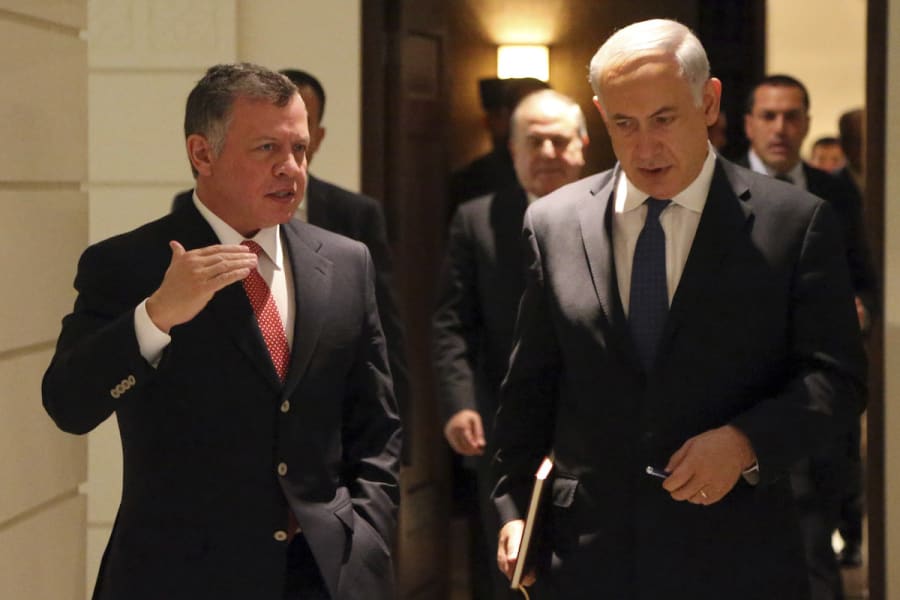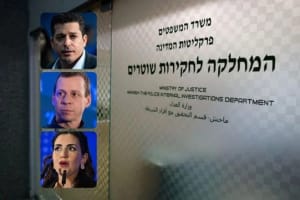Close neighbors, cold allies - reflecting on the Israeli-Jordanian relationship
Author responds to recent rebuttal from the office of Jordan’s King Abdullah II

A friend from central Israel recently asked me if I could really see Amman, Jordan from my house, located in Israel’s Judean mountains. The answer is yes.
Amman is about 70 kilometers (43 miles) to the east and, on a clear day, the skyline is visible. From the same vantage point, I can see the panorama of Jerusalem to the north, the only location from which one can see the capitals of two countries. A comparable distance to the west sits Israel’s Mediterranean coast and the Israeli port city, Ashdod. From there, a short distance to the south, is Gaza. While I cannot see the coast, I am able to witness Israel’s Iron Dome system intercepting rockets when fired from Gaza over Israel’s southern coastal cities.
My friend’s question was posed in the context of an article I wrote which challenged the comments made by the office of Jordan’s King Abdullah II which included, among other things, when he quipped that he lives “between Iraq and a hard place.” This statement led me to note that I live “between a monarch and the terrorists.”
Events in the Middle East – and their locations – are much closer to each other than most people realize; in fact, sometimes they are on top of one another.
Without repeating my entire article, I challenged at least three of King Abdullah’s latest assertions. First, that he, as the Hashemite King, is the custodian of Islamic and Christian holy sites in Jerusalem. Second, that Israel was somehow challenging the “status quo” in Jerusalem and, third, that the Christian population is in decline in the broader Middle East, implying that Israel – where the Christian population is actually growing – is somehow responsible.
Despite expressly stating my belief that King Abdullah is “quite a rational, stable and important leader, for Jordan and Israel” and that “a close alliance between our countries is important,” my words seem to have struck a nerve, earning me an official Jordanian rebuke.
In the rebuttal, the author personally referred to me no fewer than eight times, engaged in personal attacks and made other comments which distracted from the actual issues that I addressed.
In one of these comments, I was accused of “perpetuating Nobel Prize Winner Elie Wiesel’s lie (sic) when he took out an advertisement in the New York Times…saying that Jerusalem is not named in the Qur’an but named six hundred times in the Bible.”
Rather than being a rebuke or insult, being compared to Elie Wiesel in any way – an acclaimed writer, thinker and man of extraordinary morality and integrity – is a compliment and a great honor.
Several friends read the rebuttal, including the attacks against me, and commented about the degree of verbose subterfuge that was used. Someone pointed out that a person would attack another individual as a means to distract from the issue at hand. Another noted that the author of the rebuttal wrote about the “status quo” protecting the right of worshippers, but did not address that Jews and Christians are prohibited from worshipping on the Temple Mount. Still another, saw the contradiction: Omitting Jewish status makes any “status quo” agreement unfair at face value. There was more.
It's widely known that Israel and Jordan have a high level of security and intelligence cooperation. There are other levels of cooperation as well, including Israel providing 100 million cubic meters of water to Jordan each year. That’s about four times the volume of the Lincoln Memorial reflecting pool, or forty times the volume of an Olympic swimming pool.
These are good things. They come as part of high-end relationships between governments. However, while peace between Israel and Jordan has been the standard for nearly 30 years – and while Israel is a vital lifeline, providing Jordan with a steady flow of water – peace has yet to trickle down among the people. It’s a cool-to-frosty peace. It feels as if rarely a week passes by without some kind of inflammatory anti-Israel comment coming from some Jordanian political, religious, or other leader. In the past, Jordanians who were publicly known to work with Israel in various capacities have been outed and harassed in their own country.
A recent example relates to Jordan’s hostile response to Israel’s Minister of National Security Itamar Ben Gvir’s visit to the Temple Mount. That visit took place on a day when Jews mourn the beginning of the siege that ended in the destruction of Jerusalem and the Temple.
Jordan may not have liked it, and could have said so. However, instead it engaged in gross and inflammatory rhetoric, crying out that Al-Aqsa was being “stormed,” even though they knew it was not true. They could have dialed down any problem, or addressed it diplomatically. Rather, they made harsh and false declarations that did nothing other than to play to and embolden hardliners. These remarks – accusing Ben Gvir’s visit as a deliberate “provocation” – could have become self-fulfilling prophecy. It certainly did nothing to warm a chilly peace, or advance anything diplomatically.
A large part of the reason for this is that neither King Abdullah, nor his father, King Hussein, ever promoted a positive case for making peace with Israel among average Jordanians. Partially because most Jordanians are ethnically Palestinian Arabs, whereas the ruling monarchy are Hashemites, whose authority over Trans-Jordan was established just over a century ago.
Despite being direct descendants of Mohammed, the Hashemites are not exactly indigenous. The monarchy needs to play to the Jordanian street, mindful that it was a Palestinian Arab who assassinated the current king’s great-grandfather and namesake – Abdullah I – and that the Palestine Liberation Organization openly attempted to embarrass and overthrow the monarchy. This eventually led to what became known as Black September, when King Hussein slaughtered and ousted the core of PLO terrorists from Jordan in 1970.
As sad as this all is, I get it.
I see the greater good in close relations between governments and security institutions. I don’t want to see anything bad come of King Abdullah, his heirs or his family. Jordan has challenges from the north and the east, as well. It’s not in Israel’s interest for any terrorist entities to have a firm presence in Jordan, in general, nor on Israel’s border. Demographics being what they are, I understand why King Abdullah, and his father, didn’t make peace something normative between our people.
Just because I understand, doesn’t mean that it’s good. I regret that it took Jordan so long to make peace, as it was an open secret that both King Abdullah I and King Hussein had open relationships with Israeli leaders. I regret that after making peace, Jordan didn’t use it as an opportunity to change the narrative. Rather than using Israel as a convenient punching bag about which to let off steam from average Jordanians, Jordan could have cultivated a peace that would have trickled down into and throughout their society, just like Israeli water flows through their pipes. Jordan could have taken actions to underscore the value of the relationship between Israel and Jordan, even to enhance it by building mutually beneficial ties, both nationally and on a grassroots level.
Unfortunately, using Israel to deflect social problems away from the monarchy has become the standard. I’d like to see a warm peace with our neighbors on the other side of Israel’s longest border. This starts with acknowledging Jewish history starting with the Temple Mount itself, which they call the Noble Sanctuary, as being central to Jews and Christians, along with the rest of biblical history in the Land of Israel.
I’d like to see Jordan affirm that not only does this not preclude peace – or a peaceful resolution to all outstanding conflicts, including those with Palestinian Arabs – but that this acknowledgment will permit us to move forward, to coexist with mutual respect and truly live in peace. Short of this, Israel is, and always will be, portrayed and perceived as an illegitimate foreign interloper.
Jordan should be present at the table as an active partner, not avoiding international gatherings of other Arab countries that have also made peace with Israel, as it chose to do again this week. Participation sends an important message, as does skipping out on such assemblies. Relations with Israel should not be treated as some inappropriate and illicit affair.
Having made peace almost three decades ago, Jordan should put an end to – and establish a zero-tolerance policy against – Jordanian religious and civil leaders who support and incite violence toward Israel. Instead, Jordan should actively begin to help Jordanians understand and embrace the need for peace. Maybe I’m being overly optimistic, but this is the Land in which miracles happen, have already happened and are recorded in the Bible.
It will take time. I’ll be patient.
It’s partly why I wrote that I’d like to meet King Abdullah in my original article.
I think he’s a rational player who can make a difference. His “Iraq and a hard place” comment is deeper than most understand. But nothing changes by fostering a “status quo” that makes Israel illegitimate in the eyes of average Jordanians.
If the conflicting narratives remain in conflict, we will have more of the same.
If an official Jordanian response to an article by someone as insignificant as myself is loaded with ad hominem rhetoric, there’s little hope that Jordan will combat the “status quo” on the streets, where Israel remains the central and near exclusive boogeyman of the Middle East.
The King should very well work hard to preserve his legitimacy, authority and prosperity for all Jordanians. But if he does it by ‘fanning the flames’ of how bad Israel is as a way to deflect internal problems – or allowing others to do so – and does not use the relationship to create mutually beneficial win-win scenarios for all Israelis and Jordanians – as a way to enhance peace regionally and the quality of life individually - we will simply be in for more of the same. And I will continue to live “between a monarch and the terrorists.”

Jonathan Feldstein was born and educated in the U.S. and immigrated to Israel in 2004. He is married and the father of six. Throughout his life and career, he has become a respected bridge between Jews and Christians and serves as president of the Genesis 123 Foundation. He writes regularly on major Christian websites about Israel and shares experiences of living as an Orthodox Jew in Israel. He is host of the popular Inspiration from Zion podcast. He can be reached at [email protected].














